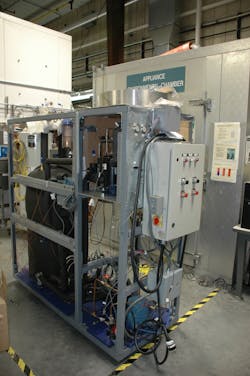DOE awards $32M for Next-Gen Building Energy Efficiency projects
The U.S. Department of Energy has awarded $32 million in funding to seven facilities for 30 next-generation building retrofit projects, aimed at improving affordable housing technologies.
The seven awardees will test renovation techniques that will enhance the energy and environmental performance of buildings effectively, quickly and affordably, while reducing disruption to tenants. These projects have the potential to revolutionize construction and renovation and provide a means to decarbonize the 130 million buildings in the U.S. faster in order to achieve the target of a net zero carbon economy by 2050.
The projects will apply innovations developed through previous funding from DOE’s 2019 Advanced Building Construction with Energy-Efficient Technologies & Practices Funding Opportunity.
Related stories
C&I Challenge: Reinventing Cold Climate Heat Pumps to handle the Extreme Weather Future
The Big IDEA: Creating Decarbonization & Resiliency for Energy at University campuses
Subscribe to EnergyTech's free, tri-weekly newsletter for more stories on Energy Efficiency
The Fraunhofer USA Center for Manufacturing Innovation in Massachusetts has received $4.9 million to test prefabricated, super-insulated wall retrofit panel blocks with high-performance building technologies at four locations in Massachusetts, Vermont, and Pennsylvania.
Home Innovation Research Labs is awarded $4.5 million to test an innovative wall system with vacuum insulated panels at three multi-family public housing buildings in Albany, New York.
The National Renewable Energy Laboratory in Colorado will use its $4.4 million for deploying software tools to size and install retrofit packages in two multi-family buildings in Arvada, Colorado.
The Oak Ridge National Laboratory in Tennessee will use the $5 million award for demonstrating 3D-printed modular overclad panels with heat pump systems in approximately 8 to 12 single-family attached public housing homes and a commercial building in Knoxville, Tennessee.
Colorado’s Rocky Mountain Institute will use its award amount ($4.4 million) to demonstrate an integrated retrofit package or a heat pump rod, envelope panels and financing in a mid-rise, low-income multifamily building with 120 units in Cambridge, Massachusetts.
The Syracuse University in New York will deploy real-time performance monitoring technology, overclad panels and an ‘HVAC pod’ in single-family attached dormitories in Syracuse, New York. It will use its $5 million for his purpose.
The University of Central Florida Board of Trustees will use its $3.6 million to demonstrate a solar photovoltaic-integrated multi-functional heat pump system for heating (water and space) in 8 manufactured homes and 4 single-family homes across six states.
The DOE’s Office and Energy Efficiency and Renewable Energy has created the Advanced Building Construction (ABC) Initiative to set the ‘ABCs’ of building renovation and construction.
Buildings in the U.S. use 40% of the total energy consumption in the US and 75% of electricity. The sector is responsible for 35% of the carbon emissions in the U.S. Buildings can use off-the-shelf equipment to save 30% by replacing windows, using insulation and using high-efficiency equipment. Such innovations will enable the U.S. to lead the way with industrialized solutions to reduce thermal energy use in buildings by 75%.
About the Author
EnergyTech Staff
Rod Walton is head of content for EnergyTech.com. He has spent 17 years covering the energy industry as a newspaper and trade journalist.
Walton formerly was energy writer and business editor at the Tulsa World. Later, he spent six years covering the electricity power sector for Pennwell and Clarion Events. He joined Endeavor and EnergyTech in November 2021.
He can be reached at [email protected].
EnergyTech is focused on the mission critical and large-scale energy users and their sustainability and resiliency goals. These include the commercial and industrial sectors, as well as the military, universities, data centers and microgrids.
Many large-scale energy users such as Fortune 500 companies, and mission-critical users such as military bases, universities, healthcare facilities, public safety and data centers, shifting their energy priorities to reach net-zero carbon goals within the coming decades. These include plans for renewable energy power purchase agreements, but also on-site resiliency projects such as microgrids, combined heat and power, rooftop solar, energy storage, digitalization and building efficiency upgrades.
